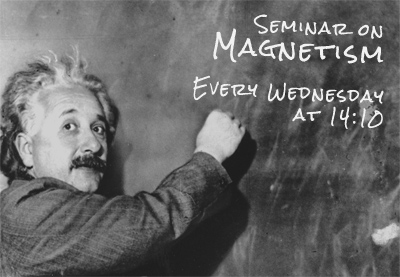Seminar on Magnetism
Group of Magnetism at the Department of Condensed Matter Physics
of Charles University and MGML has a pleasure to invite you to attend the joint seminar
on 24th September 2025 at 14:10
at Faculty of Mathematics and Physics of Charles University, Ke Karlovu 5, 121 16 Praha 2
Lecture room F2
Nathan Bujault
Institute Néel, Grenoble
Enhanced dynamics in disordered non-Kramers Ho2(Ti1-x , Hfx)2O7 classical spin ice : towards quantum spin liquid state
Nathan Bujault » Enhanced dynamics in disordered non-Kramers Ho2(Ti1-x , Hfx)2O7 classical spin ice : towards quantum spin liquid state
Institute Néel, Grenoble
Online link: cesnet.zoom.us Ask R. Colman for password.
Location: Lecture room F2, 1st floor Ke Karlovu 5, Prague 2
Dy2Ti2O7 [1] and Ho2Ti2O7 [2] classical spin ice compounds have been extensively studied over the past 30 years. Their excitations, described as emergent magnetic monopoles, exhibit very slow dynamics at low temperature, which manifests by a freezing and a strong irreversibility in Zero Field Cooled - Field Cooled (ZFC-FC) magnetization measurements [3]. It has been proposed that in spin ices made of non-Kramers magnetic ions, i.e. where J is an integer so that the ground-state crystal electric field (CEF) is a non-protected doublet, such as Ho2Ti2O7, non-magnetic disorder induces quantum fluctuations that can push the system toward a Quantum Spin Liquid phase (QSL).
This phase is characterized, inter alia, by a much faster dynamics [4,5]. Powder samples of Ho₂(Ti₁₋ₓHfₓ)₂O₇, with substitution levels ranging from 0% to 40%, were investigated through extensive magnetic and specific heat measurements, complemented by neutron spectroscopy. The controlled introduction of disorder enables a systematic study of the evolution of both static and dynamic properties of spin ice. Results show that spin ice features remain remarkably robust through all substitution rates despite a strongly perturbed local environment, revealed with neutron experiments. Macroscopic in-lab measurements indicate that the single ion physics and ground-state is similar as non disordered classical compound, and dynamical probes reveal an acceleration of both classical and quantum relaxation regimes, accompanied by a weakening of spin-ice correlations. This acceleration of the dynamics provides strong insights for disorder-induced quantum fluctuations, potentially opening the way toward the stabilization of a quantum spin liquid state at lower temperatures.
References :
[1] Ramirez, A. P., et al., Nature 399, 333-335 (1999).
[2] Harris, M. J., et al., Phys. Rev. Lett. 79, 2554-2557 (1997).
[3] Snyder, J. et al., Phys. Rev. B 69, 064414 (2004).
[4] Savary, L., et al., Phys. Rev. Lett. 118, 087203 (2017).
[5] Gingras, M. J. P. et al., Rep. Prog. Phys. 77, 056501 (2014).


